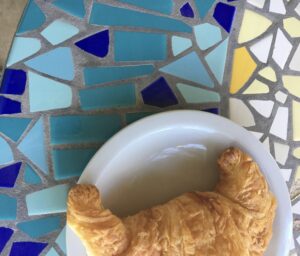 When I was a chubby five-year-old in puffed sleeves and shiny red shoes, and people asked me what I wanted to be when I grew up, I had one answer: I want to be famous. I had learned not to say I wanted to be a fireman. Everyone laughed at that. But I couldn’t say what people expected, a teacher or a nurse. I didn’t want to be a teacher or a nurse. My first grade teacher scolded me for coloring outside the lines, and coloring a cow red, so being an artist was out. Sea captain brought the same reaction as fireman, and really after that, what was left? The only reasonable dream I could imagine pursuing was Fame. Fame. I thought of it as a kind of profession in itself with few requirements and many rewards.
When I was a chubby five-year-old in puffed sleeves and shiny red shoes, and people asked me what I wanted to be when I grew up, I had one answer: I want to be famous. I had learned not to say I wanted to be a fireman. Everyone laughed at that. But I couldn’t say what people expected, a teacher or a nurse. I didn’t want to be a teacher or a nurse. My first grade teacher scolded me for coloring outside the lines, and coloring a cow red, so being an artist was out. Sea captain brought the same reaction as fireman, and really after that, what was left? The only reasonable dream I could imagine pursuing was Fame. Fame. I thought of it as a kind of profession in itself with few requirements and many rewards.
I’ve learned a few things about Fame since then. I’ve watched it hollow out the insides of some very creative people. And contrary to the assumptions of my five-year-old self, its requirements are legion and its rewards are not guaranteed. Fame can be spectacular but is most trustworthy when it doesn’t announce itself. It slips in and later, after all thought of it has left and gone home, you realize it came for you. Maybe it will come back. You keep the door open.
My brush with Fame came on a hot June day in New York City when I was no longer in puffed sleeves, and the red shoes had been replaced by black Mary Janes bought especially for the occasion. In those days, most of us only had black and white televisions—if we had a TV at all. There was no point showing off red shoes which would, for most viewers, only look gray. But the story needs to be told in a linear fashion. It began with Mr. Peepers, the pet raccoon my father brought home as a consolation prize for the three older kids in my family when my youngest brother was born. This was meant to distract us from jealousy, though we loved our brother and weren’t a bit jealous. It was obviously Dad who needed distraction.
Mr. Peepers was an artist. His favorite adventure was to open the medicine cabinet, unscrew the tops of all the liquid medicines (he had a fondness for bright pink Pepto-Bismol) and pour them into the sink where he mixed them with his hand-like paws. He’d then paint the walls and mirror, sometimes even signing the painting with his paw print in the corner. He was so adept at this we even considered some human intruder had snuck in to do this strange work. We were uneasy about that, especially as the intruder continued to return. I don’t remember which one of us caught Mr. Peepers in the act of creation, but it was a relief, and we marveled at his talent and word began to get around. Mr. Peepers became locally famous, then word spread beyond New York City where he and we lived, and one day we got a phone call. It came during the morning when we older kids were in school. My mother took the call. I imagine her sitting in the kitchen with the handset pressed between her shoulder and ear while her fingers twisted and untwisted the long, curly phone line. That evening, with my father beside her, she explained that Mr. Peepers would be going on television; she and Dad had agreed to it. He had been invited to join Captain Kangaroo and Mr. Green Jeans on a show we were all familiar with, and one of us kids would go with him. It would be my older sister, of course. She always got to do the things we all wanted to do, like stay up late on Christmas Eve or spend a night aboard the Queen Mary. We looked at her to see her delight. She’d be on Captain Kangaroo! But she just shook her head; she didn’t want to do it, so the job, the adventure, fell to me.
My mother took me to the studio very early in the morning. I thought I’d be having breakfast with the Captain, but I was on the show for no more than a couple of minutes. I sat next to him while he asked me questions I could not answer. His voice was soft, like a woman’s, and he was wearing a lot of makeup. Mr. Peepers was nowhere in sight. I would have done better if he’d been up on a stool next to me, doing his art. My dress was itchy and my shoes tight. The chair was too big and my feet didn’t touch the studio floor. I was nervous and swung my legs until I thought I would swing myself right off the chair. I watched Mr. Green Jeans walking around off-camera. I would have felt more comfortable talking to him. We could have talked about gardens and dirt and comfortable clothing. Instead, I was trying to answer impossible questions from a man dressed up like a ringmaster in a circus. He finally, mercifully, ended the interview, if that’s what it was, but he called Mr. Peepers Petunia which was strange because Petunia, I was sure, was a skunk’s name.
Those were my two minutes of Fame. They came and went and I hardly noticed them. I had other things to do, like enjoy the cinnamon bun someone offered me as my mother and I left the studio. It was sticky sweet all over and it tasted better than Fame ever could.
I have a friend whose father got up every morning and dressed for work—in a rabbit suit. I think it was pink, maybe blue. He was famous, as a rabbit, and seemed a happy man. His face was unknown, his voice had never been heard. He wasn’t a talking rabbit, like some. He hopped around in a studio much like Captain Kangaroo’s and made kids laugh.
Fame had nothing to do with his job or his life; it brushed past him and landed square on the rabbit. That was the way I felt, too, leaving the studio. Fame had dodged around me, headed for Mr. Peepers. I could go home and be myself and leave the hard work to a raccoon.

